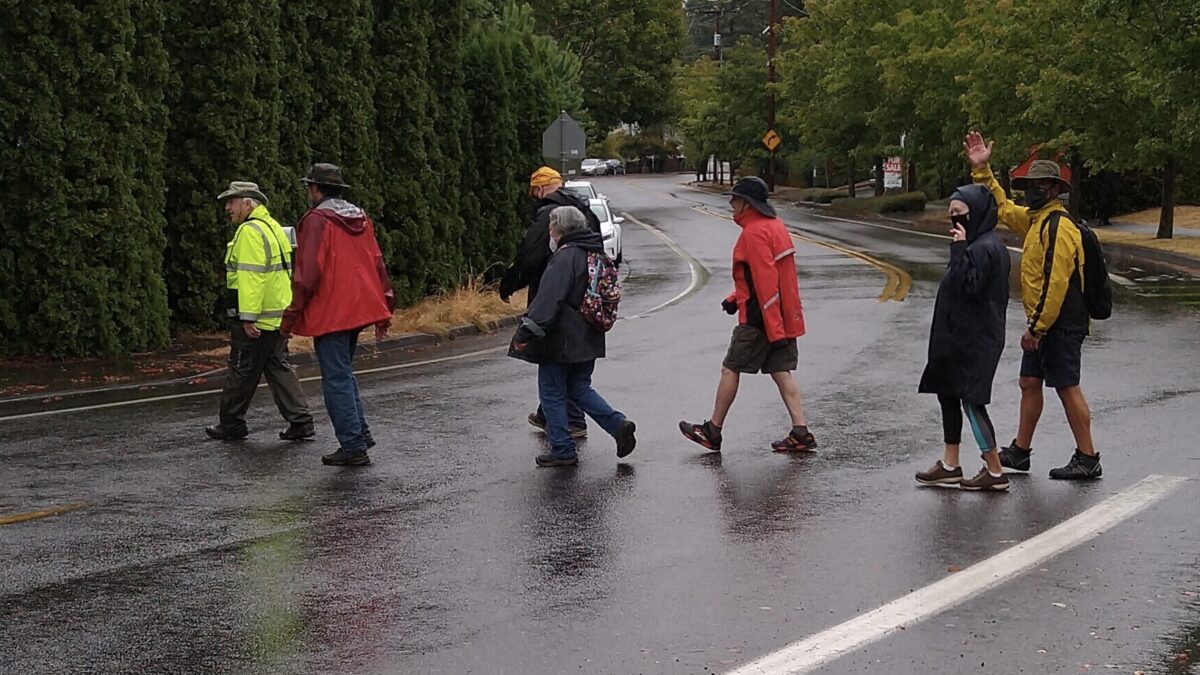
Playing David to several Goliaths, SW Trails last week threw its hat in the ring in a growing competition for a slice of Portland’s $62 million budget surplus with an open letter to the Mayor and City Council requesting $4 million to fund Portland Bureau of Transportation (PBOT) crossings projects in the southwest.
“SW PDX has 280 miles of streets, but 210 miles have no sidewalks,” wrote SW Trails founder Don Baack in an email to supporters Friday. “While the lack of sidewalks is a very serious problem, crossing our busy arterials without marked and or signaled crosswalks is even more dangerous.”
The City of Portland closed it’s 2020-21 budget with the large surplus in its General Fund balance and now city bureaus are competing for a share of that money in what is known as the Fall Budget Monitoring Process (“fall bump”). The process comes to a head in a Council vote this Wednesday, October 27. By City policy, half of the balance goes into the City’s Capital Set Aside account, which leaves over $30 million on the table.
Advertisement
The City Budget Office (CBO) itself has recommended $14 million in new requests, and the mayor and a couple of commissioners have revealed concerns about adequate police funding, affordable housing and homelessness.
According to the CBO, PBOT has requested around $18 million for projects and additional staffing including:
An appropriation of $1,682,536 of grant revenues to fund planned contract and personnel costs to support the jurisdictional transfer of 82nd Avenue from the Oregon Department of Transportation to the City (8.0 FTE).
The Bureau’s Fall BMP submission also allocates $1.8 million of contingency to fund one-time high priority needs, such as elevator repair work at the Gibbs Street Pedestrian Bridge and ongoing costs such as engineering support from safety and traffic calming improvements.
The bureau’s request also includes carryover requests, $15.2 million in capital projects and $687,000 in one-time operating costs. Notable projects include $150,000 for PBOT’s Transportation Justice Framework, $160,000 for the purchase of handheld equipment for the Parking Enforcement Division and capital improvements for Division Street: 82nd Avenue-174th and Errol Heights
So the competition for the surplus is stiff.
Projects must “fight it out at the waterholes where all others must compete for the last drops.”
—Keith Liden, cycling advocate
SW Trails is a community group which promotes walking and biking in southwest Portland. What’s noteworthy about their request is that they are soliciting money on PBOT’s behalf as an external entity, outside of PBOT’s own budget request. This end run around the transportation bureau reflects a simmering dissatisfaction among SW Portland transportation advocates about the roll-out of both PedPDX and Southwest in Motion (SWIM) projects. Advocates have been critical of what they believe is a non-transparent funding process, and a low priority given to SW projects in general.
SWIM sorted projects into tiers, and each project came with identified potential sources for funding, but not with the funding itself. Instead, projects compete with other city-wide projects in a sausage-making process internal to PBOT, with individual projects receiving the go-ahead without, advocates claim, a logical order obvious to outsiders.
Long-time cycling advocate Keith Liden, who was a member of the SWIM community advisory committee, described the process as an example of a classic black box and recently criticized city implementations which make projects “fight it out at the waterholes where all others must compete for the last drops.”
SW Trails is asking the city to fund all the SW crossing projects in one fell swoop, and has suggested a protocol for a more collaborative project selection process between the bureau and the community.
SWIM reaches its two-year anniversary this December. Chapter 8 of the plan document, Implementation and Monitoring Success, describes the funding landscape and states in large font that “Future transportation funding is required to make this plan a reality. The prospects for future funding are promising, but uncertain.” It also states that PBOT “should track and report the progress made toward implementation of the recommended projects, policy initiatives and featured programs” on a biennial basis. Hopefully, a report will be out in the next few months and it will bring clarity to these issues.
Learn more about the Budget Monitoring Process and how to share your feedback at the city’s website.

— Lisa Caballero, lisacaballero853@gmail.com
— Get our headlines delivered to your inbox.
— Support this independent community media outlet with a one-time contribution or monthly subscription.







Thanks for reading.
BikePortland has served this community with independent community journalism since 2005. We rely on subscriptions from readers like you to survive. Your financial support is vital in keeping this valuable resource alive and well.
Please subscribe today to strengthen and expand our work.
Someone needs to get sued for neglecting such basic infra as pedestrian crossings.
The SW In Motion (SWIM) plan was adopted almost 2 years ago. As a member of the SWIM stakeholder advisory committee, I’m naturally interested in its implementation progress, which was intended to be a “short-term refinement, prioritization and implementation action plan for walking and biking access and safety projects in Southwest Portland” according to an introductory statement in the plan. Compared to the other In Motion plans the city has completed, SWIM’s progress over the past 2 years isn’t clear to me at least, except for a few projects, such as the recent Montgomery/Patton/Talbot intersection (very good BTW). PBOT’s SWIM website continues to provide little information since the plan’s adoption.
In contrast, Northwest In Motion (adopted about 6 months after SWIM) has made significant and obvious progress. Flanders Bridge aside (in the works before NWIM), entire bike routes and pedestrian connections have been transformed over the past last year. Central City In Motion also provides status information regarding projects. In SW, spot project improvements are made, but the dots often aren’t connected to create tangible benefits for important ped/bike routes and connections.
In Chapter 8 of the SWIM plan regarding implementation and monitoring success, a section about community advocacy states: “Continued community advocacy for projects will be instrumental to the success of this plan. The Southwest in Motion project descriptions in Appendix A are designed to provide the critical information necessary for neighborhood advocacy of local priority projects. Effective advocacy with the bureau and with local elected officials will provide continued urgency to addressing the real infrastructure deficiencies of Southwest Portland.” So PBOT placed much of the implementation responsibility on SW advocates to really make this plan happen. Looks like SW Trails is taking the city up on it. Your move PBOT.
In fairness, Portland inherited much of the transportation disinvestment (and infrastructure generally) liabilities associated with suburban development that occurred while under county jurisdiction after WWII. But the active transportation investment drought continues to this day. Time for a little rain.
“So PBOT placed much of the implementation responsibility on SW advocates to really make this plan happen.”
In large part, this has been the case. SW has had a number of projects done, some through SWIM and some through Greenways, SRTS, etc., mostly through close contact with local advocates (with a few surprise bonus projects). It may not seem like many because they are scattered so widely, and there are soooo many deficiencies still existing! But if there is a SWIM project in your area, working the email and phone trees (politely) sometimes gets results. I know of one project where staff said they would work up the scope of the project (what it entails and cost estimates) but the neighborhood would be responsible for lobbying mangement and council to have that scope included in next budget cycle. The person you talk to may understand the need, but they need help getting a piece of the budget pie to meet it.
Repairing the Gibbs Street elevator is certainly high priority, but it should not require “one time contingency funding”. PBOT should plan these kinds of repairs into their regular budget so that they are prepared to make the repairs when needed.